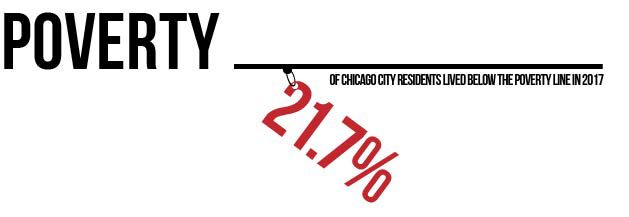Chicago creates basic income task force
Chicago creates basic income task force
September 21, 2018
Mayor Rahm Emanuel has created a task force to determine the viability of a guaranteed income program which would provide some Chicago residents a no-strings-attached monthly income.
“If [Chicago gave] me a set amount of money every month, I know my paycheck can go into my savings account, rather than wondering if I’ll have a savings account in a month or two,” said Chelsea Gulbransen, an Albany Park resident and wedding coordinator at George Street Photo and Video.
To maintain a balanced budget, Gulbransen said she works two full-time jobs, nearly 80 hours a week, but her hours can fluctuate.
The Chicago Resilient Families Initiative Task Force was sponsored by 36 alderman when it was introduced June 27, according to the Office of the City Clerk’s records.
Alderman Ameya Pawar (47th ward) proposed in June that Chicago should implement a universal income. Pawar’s plan would give 1,000 residents $500 a month, according to a document tweeted by Pawar June 27.
If Chicago were to implement Pawar’s suggestion, Michael Mendelson, a fellow of the Maytree Foundation, an Ontario based poverty policy research group, said it would still not be enough.
“If [a program awards] a $500-a-month payment, that’s guaranteed poverty. It’s not going to get anyone out of poverty,” Mendelson said.
Mendelson said calling the program a universal income is not correct because Chicago would not give everyone funds. Mendelson suggested calling the program guaranteed annual income.
If Chicago were to attempt a basic income program, it would likely follow a negative income tax model, which would guarantee a certain amount of funds and gradually decrease as people earned more money, Mendelson said.
In 2017, Ontario implemented a basic income program which gave 4,000 residents up to $1,400 a month, according to Tom Cooper, director of the Hamilton Roundtable for Poverty Reduction, an anti-poverty advocacy group. Disabled residents qualified for approximately an additional $500 a month.
The program was canceled after provincial elections removed the administration that implemented the program. The program will be phased out by March 2019, according to Cooper.
Cooper said there is no data on the success of the program because it was only in place for a year. There was no evidence the program should have been shut down either, he added.
Cooper works in the Hamilton community where about 1,000 peoplehave received the income boost.
“People were using the basic income to improve themselves,” he said.
If Chicago were to implement a program similar to this—and if she became eligible—Gulbransen said she would spend the money on activities and to purchase clothing.
Chicago has been raising its minimum wage since 2015 to address ongoing income concerns, including an increase to $12 an hour in July, as reported July 3 by The Chronicle.
The living wage for one adult in Cook County is $13.30 an hour and higher for adults with children.
“No parents who work full-time in the City of Chicago should ever have to raise their children in poverty,” Emanuel said in a June 26 mayoral press release regarding minimum wage.
Minimum wage increases should be implemented along with other programs to provide residents with basic income, Cooper said.
In the past year, Ontario increased its minimum wage by over $2, with the basic income still in effect, Cooper said.
“People felt a lot better about themselves. They started dreaming about the future,” Cooper said. “We saw people interested in going back to school and upgrading their skills and trying to improve their lives.”








